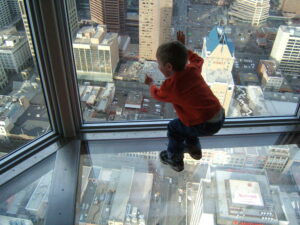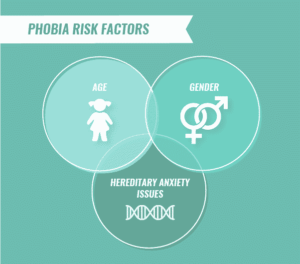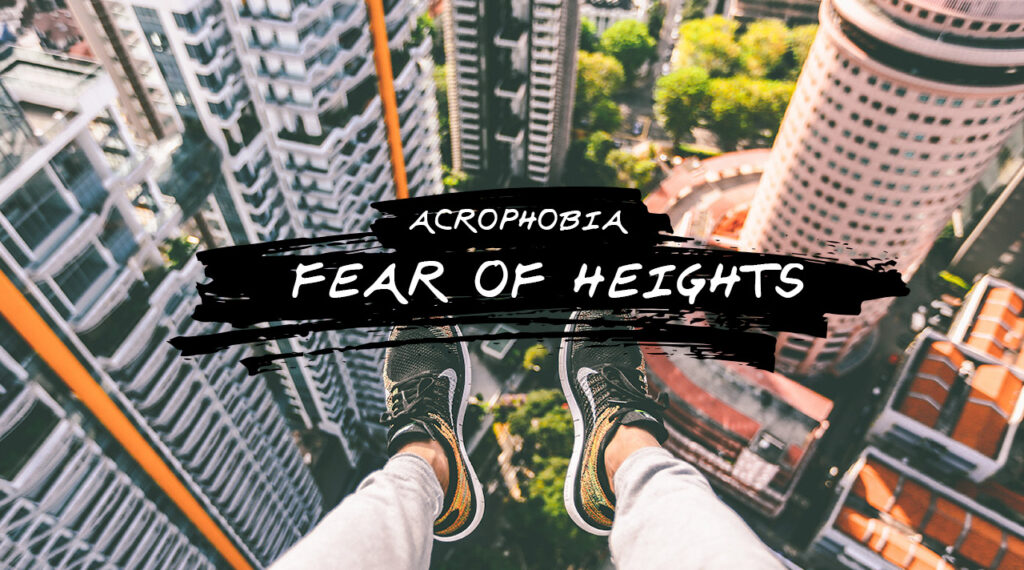Acrophobia is when you are in a high place and your heart starts beating fast and you feel like throwing up. For some people it’s just the thought of being high up; for others, they can’t deal with any height at all. If you suffer from acrophobia and want to get over it, there are many different ways to do so–from medication to counseling and more!
Contents
- 1 What is Acrophobia?
- 1.1 Are You Accidentally Cultivating Acrophobia?
- 1.2 Symptoms of Acrophobia
- 1.3 What Causes The Fear Of Heights?
- 1.4 Diagnosis Of Acrophobia
- 1.5 How To Overcome The Fear Of Heights?
- 1.6 Treatment Options For Acrophobia
- 1.7 Preventive Tips For Acrophobia
- 1.8 Risk Factors of Acrophobia
- 1.9 Severe Acrophobia Surface Area
- 1.10 Helping Someone With The Fear
- 2 Conclusion
What is Acrophobia?

Acrophobia is a fear of heights. It can be the fear of being in high places, or it can be the fear of looking down from high places. For some people, even just thinking about being in a high place can send their heart racing and make them feel sick to their stomach.
Acrophobia is not a very common fear, but it is one that a lot of people suffer from. It’s estimated that about two to three percent of the population suffers from some sort of acrophobia. And women are more likely than men to suffer from acrophobia. Luckily, there are many ways to get over this fear!
Acrophobia can be treated in several different ways–depending on the severity of your symptoms and how much you want help overcoming your fear. You may just need to talk to a counselor and get some advice on how best to cope with your anxiety. But, if you do need medical treatment, there are many different options for medication that can help control the symptoms of an acrophobic attack.
Are You Accidentally Cultivating Acrophobia?
Acrophobia is a fear of heights. Sometimes people get scared of heights. This is called acrophobia and it can come from working at a high place for a long time. People who work in jobs where they are always at high places, like construction workers, are more likely to have this problem. If you work on scaffolding or bridges, it’s important that you be aware of the symptoms and take care not to let your fear get out of hand–especially if working high up puts your job at risk!
Symptoms of Acrophobia

If you have acrophobia, you may experience some or all of the following symptoms:
- Racing heart
- Feeling sick to your stomach
- Trembling or shaking
- Sweating
- Feeling dizzy or lightheaded
- Difficulty breathing
- Fear of losing control or panicking
- Fear of dying
What Causes The Fear Of Heights?
There is no definitive answer to this question. Some experts say that it’s a natural fear that helps keep us safe, while others say that it’s the result of a traumatic experience or simply being overexposed to heights. Whatever the cause, if you suffer from acrophobia, there are ways to get help!
Acrophobia is a persistent, conditioned fear of heights. It can be triggered by any number of things, including a traumatic event that took place at heights, such as:
- falling from a high place
- watching someone else fall from a high place
- having a panic attack or other negative experience while in a high place
Diagnosis Of Acrophobia
If you are afraid of heights, your doctor can help diagnose this. They will ask questions about how often you are scared and what triggers it. They may also ask if anyone in your family suffers from similar conditions or phobias. If you’re seeing a therapist for other reasons, they may be the first person to suggest that you have acrophobia.
How To Overcome The Fear Of Heights?

There is no one-size-fits-all answer to this question, as the best way to overcome a fear of heights will vary from person to person. However, here are some general tips that may help:
- Talk to a counselor about your fears and get some advice on how best to deal with them.
- Take a gradual approach to getting used to heights. Start by looking at pictures of high places, then move on to watching videos or movies of high places, and finally try going to a place that’s not too high up but still offers a good view.
- Use relaxation techniques such as deep breathing exercises or yoga to help control your anxiety and keep your heart rate down.
- Make sure you’re properly hydrated and eat a healthy diet to help control any physical symptoms you may experience.
- If possible, try to avoid situations where you’ll be near heights. This may mean avoiding amusement parks, hiking trails, and other outdoor activities.
You don’t have to live your life in fear of high places. It is hard to overcome acrophobia. But it can be done with hard work and patience. People who are not afraid of heights can go on buildings or ride in an elevator without being reminded of their panic attack.
Treatment Options For Acrophobia

- Cognitive Behavioral Therapy (CBT): A type of therapy that helps you change the way you think about your fear and teaches you how to deal with it more positively.
- Exposure Therapy: This involves gradually exposing yourself to heights in a safe and controlled environment, such as an amusement park or hiking trail.
- Medication: There are a variety of medications that can help control the symptoms of an acrophobic attack. Some medications, on the other hand, can assist with the signs of panic and anxiety, such as:
- Beta-blockers. If you are anxious, these medications will keep your heart rate and blood pressure steady. They also help to reduce other physical symptoms of anxiety.
- Benzodiazepines. The class of medications that includes Valium and Xanax is known as sedatives. They can help with anxiety symptoms, but they’re usually only used for a limited time or in certain situations. They can be addictive.
- D-cycloserine (DCS). This drug may help you with your anxiety. A study showed that it helped people who had different kinds of anxiety.
- Education about heights and the fear of falling – This helps you understand what is happening when you experience an attack and why the fear is irrational.
Preventive Tips For Acrophobia
- Work on building up your confidence and self-esteem, which allows you to face situations more calmly; this will make it easier for you to prevent future incidents from triggering further fear or anxiety.
- Avoid things that remind you of past negative experiences with heights, such as watching movies or reading books about acrophobia.
- Stay hydrated and eat healthy foods to help manage physical symptoms. If possible, avoid places where you might have a panic attack (elevators, amusement parks).
- Try not to feel guilty if your fear of heights limits your activities or causes you to miss out on some experiences. Remember that everyone is different and there’s no shame in having a fear that doesn’t bother other people.
- Talk to a counselor about your fears, join a support group for people with acrophobia, or look into therapy options like CBT or exposure therapy. These options can help you overcome your fear and enjoy life once again!
If you are someone who suffers from acrophobia, know that you are not alone. This persistent fear of heights affects millions of people all over the world and there is help available. By using some of the tips mentioned in this article, you can start to overcome your fear and live a fuller life. Don’t be afraid to ask for help if you need it.
Risk Factors of Acrophobia

Many different factors affect the likelihood of developing acrophobia, including:
- Gender – more women than men develop phobias.
- Age at which your fear developed – usually during childhood or adolescence; however, an onset in adulthood is not uncommon either.
- Family history and genetics – If other members of your family have a fear of heights, you are more likely to develop acrophobia yourself.
- Previous traumatic experiences – if you’ve had a negative experience related to heights (such as a fall), your risk for developing acrophobia increases.
There is no one cause for acrophobia and it can affect anyone at any time. However, some risk factors may increase your chances of developing acrophobia.
Severe Acrophobia Surface Area
People who are afraid of heights can only go some places. If someone has a phobia, then that person will not want to go outside the house because it is too scary.
However, there is hope for people with severe acrophobia who want to enjoy a fuller life! By working with an experienced therapist or coach, you can get over your fear of heights and enjoy all the things that living has to offer.
To get over your fear of heights, you need to know why it is happening and how people get better. Some treatments work better than others for some people. If you want the best success, then find a therapist or coach who has had success with other people’s fears of heights.
Helping Someone With The Fear

If you are in a relationship with someone who has acrophobia, it is important to be supportive and understanding of their feelings. Try not to push them into situations that make them uncomfortable or cause anxiety. Instead, suggest alternatives or allow your loved one time to get used to the idea before trying again later on when they feel more comfortable.
If you are a friend or family member of someone with acrophobia, there are things you can do to help them feel more comfortable and safe. Here are a few tips:
- Don’t tease them about their fear or make fun of them. This can only make things worse.
- Avoid putting them in situations where they will have to confront their fear.
- Let them know that you support them and are there for them, no matter what.
- Suggest fun activities that don’t involve heights, like going to the beach, playing in a park, or watching a movie.
If you know someone who suffers from acrophobia, it is important to be understanding and supportive. Remember, everyone, deals with their fears in different ways. Some people may feel comfortable trying exposure therapy or joining a support group, while others may prefer talking to a therapist. No matter what option your loved one chooses, be there for them every step of the way!
Conclusion
If you want to overcome your fear of heights, there are several options available. You might try cognitive behavioral therapy or exposure therapy for example. Additionally, you can explore some natural remedies that are effective by numerous studies over the years. For instance, many people who suffer from acrophobia find relief when they take magnesium supplementation on an ongoing basis. Magnesium has also shown efficacy in treating anxiety symptoms associated with panic attacks and other phobias according to research published in The Journal of Clinical Psychiatry back in 2007. This article is not for any medical advice but simply provides information about this topic. Sometimes people are afraid of heights. This is acrophobia and it can come from working at a high place for a long time. People who work in jobs where they are always at high places, like construction workers, are more likely to have this problem.
If you are looking for affordable Online Counseling MantraCare can help: Book a trial therapy session


